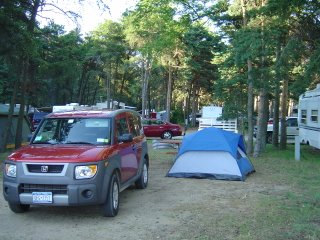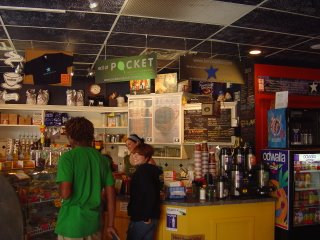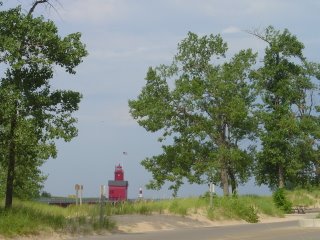Wednesday, August 02, 2006
Still in Michigan: Holland
 From Saugatuck I drive a few miles north to Holland, Michigan. I don't really know why, except that there's a campground at the Holland State Park, and the promise of lots of good bike trails. When I reserved my campsite, I asked for the beach campground, which was full. And what a stroke of luck that turns out to be. The beach campground is a treeless, sun-blasted stretch of pavement suitable only for Focker wannabes. My own campsite at the other campground, a mile or so away, is one of the worst ones in the place but has shade and dirt in which to pitch my tent.
From Saugatuck I drive a few miles north to Holland, Michigan. I don't really know why, except that there's a campground at the Holland State Park, and the promise of lots of good bike trails. When I reserved my campsite, I asked for the beach campground, which was full. And what a stroke of luck that turns out to be. The beach campground is a treeless, sun-blasted stretch of pavement suitable only for Focker wannabes. My own campsite at the other campground, a mile or so away, is one of the worst ones in the place but has shade and dirt in which to pitch my tent.The campground also supposedly has wi-fi, but I can't get it to work, so I spend a couple of hours at Lemonjello's an excellent little coffeehouse in Holland proper. A sign on the door informs that "Mustaches are not gender specific" and they don't mind when, after I ask nicely, I take a picture of the place for your benefit.

Holland was settled, as you might guess, by Dutch immigrants, and their influence is everywhere: Dutch Village, a sort of pre-theme park devoted to Dutch culture that hadn't changed an iota in the thirty years between when I visited it as a child and when my siblings and I took my brother's kids there in 2005 (except, I suppose, for the Wal-Mart across the street). There's a city park called Windmill Island, which has a large windmill that I don't go to see, and Hope College, which is affiliated with the Dutch Reformed Church, and a wooden shoe factory, and a tulip festival in May, and so on. (There's also a Heinz plant, and in a certain quarter of town I get a whiff of worchestershire sauce as I drive along.)
And there's a notable lighthouse that's referred to locally as "Big Red."

It takes me a while to find the bike trails in Holland. I'm looking for one that follows the lakeshore to Grand Haven, but what I discover is that while it more or less follows the lakeshore, it doesn't actually have a view of the lake. Most of the Michigan lakeshore is occupied by private homes and resorts like - well, like Palisades Park. So the Holland-to-Grand Haven trail mostly looks at the backs of those houses and resorts.
Still, it's a smooth, well-maintained trail for the ten miles or so that I'm on it. The literature I had been reading suggested that Holland's abundance of bike trails results from, of course, the Dutch practice of commuting by bicycle. I don't take this very seriously when I read it. But as I'm riding around, I decide there may be some truth to this. The paths aren't particularly designed for recreational purposes - certainly you can use them for that, and plenty of people are this morning. But they mostly run alongside the major streets, not just in the center of town but out into the outskirts of Holland and the countryside - exactly as you'd lay them out if you were planning to make bikes a viable transportation method. I can't say that I see anyone who looks as if they're commuting by bike - I can't say that I see anyone who doesn't look like they're on vacation - but to do so would be not just possible here but easy.
(At least in the summertime. There's no indication that anyone skates to work in the winter.)